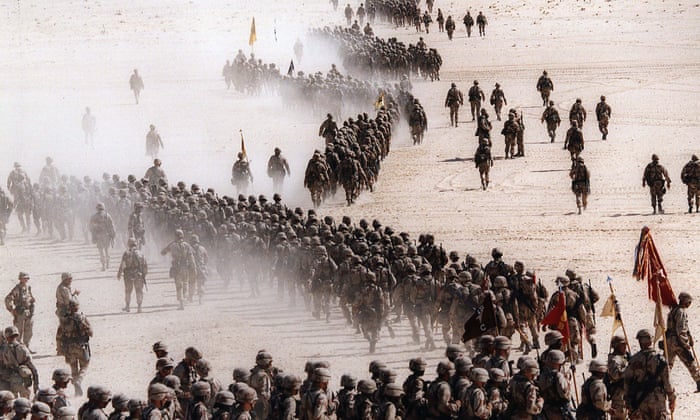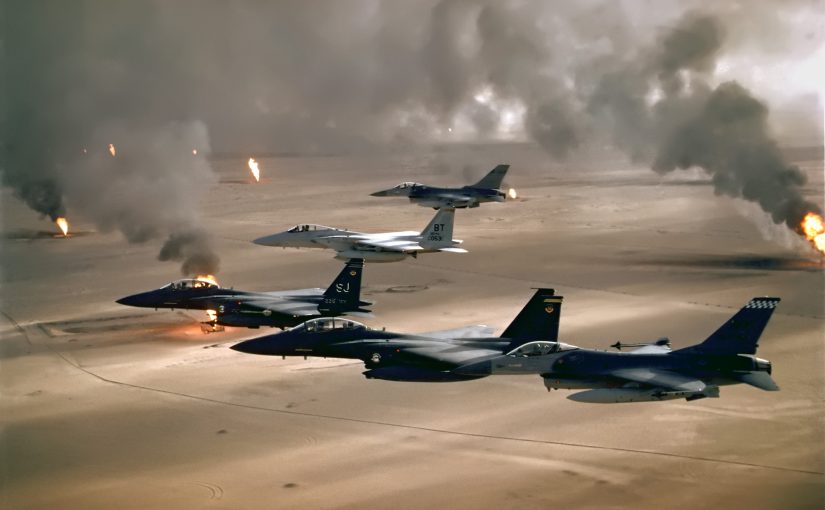Due to some territorial disputes, Iraq was thrust into war with Iran, a country that had recently undergone a fundamentalist Islamic revolution. During the fighting, Saddam Hussein deployed chemical weapons on his own people in the Kurdish areas, where Iran’s forces were advancing. At the time, the US, an ally of Iraq, turned a blind eye to these war crimes. However, the war eventually came to an end with no real winner on either side. However, because of the effort it took, Iraq had a lot of countries donate money, weapons and resources. One such country was Kuwait.
Kuwait was an incredibly rich country due to its plentiful oil fields however was currently undergoing a financial recession due to a stock market crash. Kuwait was in desperate need of money so they began asking Saddam Hussein for the money back. However, Iraq was in no position itself to give the money back. Iraq, as well as many other countries in OPEC (Organization of the Petroleum Exporting Countries) were also frustrated that Kuwait was producing too much oil and overfilling their quotas. Once Kuwait announced it would limit oil production, Hussein found another bone to pick with Kuwait, claiming that they were tapping Iraqi oil fields for their own production.
It is also possible that Hussein had an ulterior motive. Iraq and Kuwait were both formerly a part of the Ottoman Empire until its collapse after World War 1 and Hussein believed that Kuwait was rightful Iraqi territory.
Iraq demanded that Kuwait pay $10 billion to them. In exchange, Kuwait offered only a fraction of that, at $500 million. Outraged by this, Hussein ordered troops to begin invading Kuwait on August 2nd, 1990, around a year and a half before the collapse of the Soviet Union. Kuwait, due to its dire lack of military … anything, put up practically no fight. A puppet government was established before Hussein declared that Kuwait was now simply a province of Iraq.

The UN Security Council immediately denounced the invasion unanimously, and demanded the immediate withdrawal of Iraqi troops from Kuwait. This council included the United States, who believed that Hussein was threatening US oil interests in the region. George H. W. Bush, the then president and former VP to Ronald Reagan and director of the CIA, feared that Hussein may invade Saudi Arabia next, a strong ally of the United States.
Bush managed to bring many other NATO countries on board for an attack if needed, including the United Kingdom, France, Egypt and Saudi Arabia, with many others providing support. However, the US would still lead the majority of the effort. Due to Gorbachev’s policies, the US had now become the lone superpower. However, Gorbachev and Bush both agreed that the Iraqi aggression had to be crushed.
[Gorbachev and I] are united in the belief that Iraq’s aggression must not be tolerated. No peaceful international order is possible if larger states can devour their smaller neighbors. [I]f old adversaries like the Soviet Union and the United States can work in common cause, then surely we who are so fortunate to be in this great Chamber—Democrats, Republicans, liberals, conservatives—can come together to fulfill our responsibilities here.
George H. W. Bush, Joint Congress Session, 1990
A trade embargo was then established on August 6th. However, despite all this, Hussein refused to back down, as many Kuwaiti protests occurred, which were often violently crushed. Eventually, an ultimatum was issued to Iraq, for troops to leave Kuwait by January of 1991 or the United Nations (and when I say the UN here, I mean the US but that’s not technically official but we move) would “use all necessary means” to force him out. Hussein, obviously, ignored this ultimatum and, on January 16th, Operation Desert Storm began.

Bombing raids were conducted from the air whilst marines began moving into the Persian Gulf. In an attempt to bring other Muslim majority countries into the war, Hussein attacked Israel with missiles, hoping they would counter attack. Israel did not and Iraq stood alone against the coalition. Soon, ground forces began moving through Kuwait and overwhelmed the Iraqi soldiers. Their vastly inferior technology and weaponry stood no chance against the United States. Iraqi troops began burning oil fields, causing massive air pollution and costing Kuwait $1.5 billion. Instead of choosing to fully invade Iraq, Bush chose to withhold coalition forces, stating that:
“To occupy Iraq would shatter our coalition, turning the whole Arab world against us, and make a broken tyrant into a latter-day Arab hero,”
George H. W. Bush, “A World Transformed”, 1998
The embargo was never lifted on Iraq, which led to poverty and starvation skyrocketing to unforeseen levels. Northern Kurds and southern Shiites (a branch of Islam, like Catholicism or Protestantism in Christianity) both rebelled against Saddam in uprisings that were brutally crushed.
Due to the chemical weapons that were used in the Iran-Iraq War, the United States accused Hussein of hiding WMDs (Weapons of Mass Destruction), which is a wider umbrella term that includes nuclear and biological weapons as well as chemical. After Hussein denied the United Nations to check for such weapons, Bill Clinton, the president after George H. W. Bush, initiated Operation Desert Fox, which involved the dropping of bombs on Iraqi military sites, in an attempt to destroy any possible WMDs that Iraq may have had. George H. W. Bush’s son, also called George Bush, later invaded Iraq in the Iraq War, with troops not leaving until 2011.
